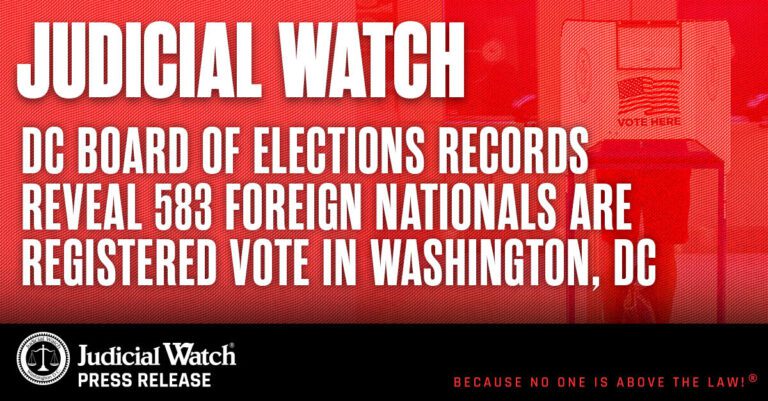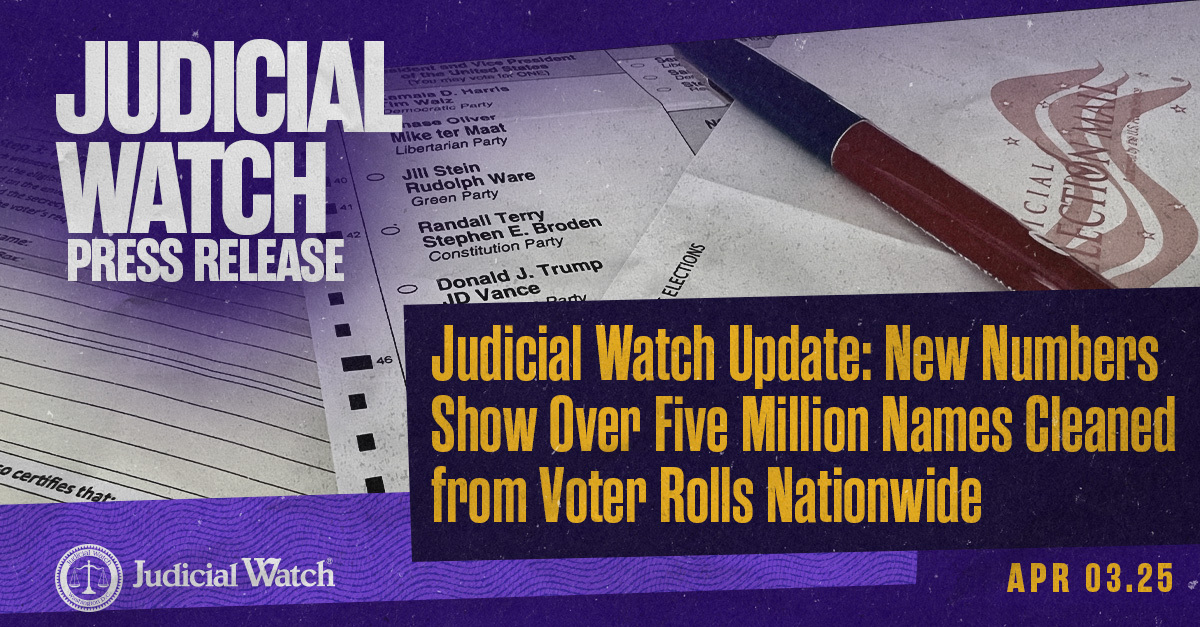
Judicial Watch: DC Board of Elections Records Reveal 583 Foreign Nationals are Registered Vote in Washington, DC

(Washington, DC) – Judicial Watch announced today that it received records showing that, as of June, 583 foreign nationals are registered to vote in Washington, DC. The records from the Board of Elections also confirm that noncitizens can be election workers.
Judicial Watch received the documents in response to a May 14, 2024, Freedom of Information Act (FOIA) request for records regarding the number of noncitizens registered to vote in Washington, DC, under the Local Resident Voting Rights Amendment Act.
In 2022 the DC Council amended the District of Columbia Election Code of 1955 “to expand the definition of the term qualified elector for the purpose of local elections to include otherwise eligible non-citizen residents.” The act went into effect in 2023 and allows noncitizens to vote in local elections for positions including mayor, attorney general, city council member, State Board of Education member or Advisory Neighborhood Commission member. Noncitizens can also vote on local referendums, ballot initiatives and recalls.
An analysis of DC voter registration records made available to Judicial Watch shows that on June 13, 2024, the makeup of registered voters in DC was:
- Total Voters: 457,302
- US Citizens: 456,719
- Foreign Nationals: 583
- Democrats: 353,048
- Republican: 23,482
- No Party Affiliation: 73,760
- Other: 7,012
DC records also show that noncitizens can work at the polls if they are:
- A DC resident
- At least 16 years of age
- Attend or has graduated from a public or private secondary school or institution of higher education
- Are able to speak English
The records describe a virtual town hall meeting on April 30, 2024, that explains voting to noncitizens (previously disclosed by Judicial Watch). Among the topics:
- What offices can non-citizens vote for? Which ones can they not vote for?
- Voter Registration and Voter Rights/Responsibilities
- How does voter registration work? Steps and options on how to register to vote.
- What kind of language access resources does DCBOE provide for voter registration?
- Ballots: show a sample
- Language Access
- General language access overview
- Election Day resources for Language Access: what does the DCBOE [Board of Elections] provide?
- Election must knows
- Important dates and deadlines including ballots mailed, voter registration, party affiliation, Early Voting hours, and Primary Election Day
The records obtained by Judicial Watch include a Board of Elections meeting transcript that explains that noncitizens are not required to have an ID to vote. If they do not have proof of residence when they go to register to vote or vote for the first time they can still vote by “Special Ballot.” Also, prisoners are also welcome to vote, according to a “Voting Guide for Incarcerated Residents:”
As a District of Columbia resident, you have the right to vote, even if you are incarcerated.
Even if you are in a correctional facility outside of the District of Columbia, if you are registered, you do not lose your residency status and you have the right to vote.
Once you are properly registered, you will be mailed a ballot prior to any District of Columbia election for which you are eligible.
If your ballot was mailed to your place of incarceration and you were released prior to receiving it, you can still vote at any Vote Center during Early Voting or on Election Day.
“The fact that over 500 foreign nationals can vote in local elections in Washington, DC, is a national scandal and an insult to every America citizen,” Judicial Watch President Tom Fitton said. “Congress can and must stop this attack on the voting rights of citizens.”
In May 2024, Judicial Watch received records from the District of Columbia, explaining to illegal aliens and other noncitizens how they can register to vote in local elections.
According to federal law, only U.S. citizens can vote in federal elections, but a growing number of state and local elections allow noncitizens to vote, among them are San Francisco and Oakland, California, along with some cities in Maryland and Vermont. In February, a state appeals court ruled a similar New York City law violates the state constitution.
###
















